|
|
|
Sort Order |
|
|
|
Items / Page
|
|
|
|
|
|
|
| Srl | Item |
| 1 |
ID:
126099
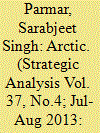

|
|
|
|
|
| Publication |
2013.
|
| Summary/Abstract |
Changes in the Arctic topography due to climate change have resulted in the region, which erstwhile was remote with little accessibility, to being accessible with potential natural resources and attractive navigable sea areas. The prospects have also influenced the strategic contours of the Arctic and brought in many actors that view the region as a resource-rich area with viable commercial interests. The Arctic attraction has gained significance as an economic goldmine with estimates indicating the region to hold about 22 per cent of the undiscovered, technically recoverable resources in the world. The approximate breakdown as per a US Geological Survey report is about 13 per cent of the undiscovered oil, 30 per cent of the undiscovered natural gas, and 20 per cent of the undiscovered natural gas liquids in the world. About 84 per cent of the estimated resources are expected to occur offshore.
|
|
|
|
|
|
|
|
|
|
|
|
|
|
|
|
| 2 |
ID:
126100


|
|
|
|
|
| Publication |
2013.
|
| Summary/Abstract |
The Barents Euro-Arctic Region (BEAR),1 which in terms of land territory is one of the biggest international region-building projects in Europe, was established in 1993 to meet the new security challenges following the breakup of the Soviet Union and the opening up of the borders between East and West. Stretching over major parts of Northwest Russia and three Nordic countries, the region bridges areas, which for decades were heavily influenced by high Cold War tensions and deep social, economic and political cleavages. With the formal establishment of the Barents Cooperation, the involved countries signaled an important shift from hard security priorities to an alternative and diversified security approach, which included emphasis on regional political cooperation, cross-border human contacts and the formation of common regional identities.
|
|
|
|
|
|
|
|
|
|
|
|
|
|
|
|
| 3 |
ID:
126095
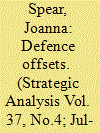

|
|
|
|
|
| Publication |
2013.
|
| Summary/Abstract |
How effective are offsets as a means to boost a domestic defence industry? This article takes a novel approach to answering this question; examining global data on levels of defence sales over three decades as a measure of successful defence industrialisation (i.e., using the market as an indicator of success). The quantitative data points to a mixed picture as despite the ubiquity of defence offsets, they are no guarantees of success in defence industrialisation. It concludes that offsets can be an important part of a defence industrialisation strategy, but are not in themselves sufficient for success.
|
|
|
|
|
|
|
|
|
|
|
|
|
|
|
|
| 4 |
ID:
126088
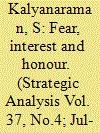

|
|
|
|
|
| Publication |
2013.
|
| Summary/Abstract |
Nearly 2,500 years ago the Greek historian Thucydides noted that the foreign policy of Athens was driven by fear, interest and honour. That these motives continue to drive policy even today is reflected in the three approaches most commonly employed in the study of international relations: realism and neo-realism, which emphasise the pursuit of power and security in an anarchical international system characterised by the security dilemma; liberalism and neo-liberalism, which highlight interdependence and the pursuit of economic interests; and institutionalism and constructivism, which stress upon identity and the quest for prestige and social recognition. 1 How does India's approach to its Asian neighbourhood fit within this three-dimensional framework of fear, interest and honour? That is the question which this commentary explores.
|
|
|
|
|
|
|
|
|
|
|
|
|
|
|
|
| 5 |
ID:
126090
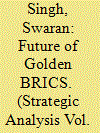

|
|
|
|
|
| Publication |
2013.
|
| Summary/Abstract |
With the successful holding of the fifth summit of Brazil, Russia, India, China and South Africa (BRICS) in Durban during March 26-27, 2013, this influential group of emerging economies completed its first important phase of genesis and evolution. The idea was floated in 2001 as an 'acronym' created by an investment banker of Goldman Sachs, Jim O'Neil who believed that the fast-growing economies of Brazil, Russia, China and India would be the single greatest game changers in coming times. The resultant informal group began holding annual summits in Yaketeranberg in 2009 and its pace of progress has since surprised many-including its own creator Jim O'Neil, who does not hide his disappointment at what has come about of his original vision.
|
|
|
|
|
|
|
|
|
|
|
|
|
|
|
|
| 6 |
ID:
126091


|
|
|
|
|
| Publication |
2013.
|
| Summary/Abstract |
In 1971, India intervened militarily on behalf of Bengalis in the civil war in East Pakistan, dividing the country into two. The prospect of another civil war in Pakistan pitting radical Islamists against the secular but authoritarian military raises questions about the possibility, timing, objective, and nature of another Indian intervention.
This commentary argues that history is unlikely to repeat itself. Indians, Pakistanis, and foreign observers have overstated the strategic boldness of the Indian decision to invade East Pakistan in 1971; the invasion was far more reactive and limited. The conditions in Pakistan today are dramatically different from the past, making a similar invasion improbable. First, unlike the Bengalis in East Pakistan, India does not have a natural ally in a conflict between radical Islamists and the authoritarian Pakistan army. Indeed, most Indians see the two sides as allied rather than inimical, and the conflict between them as the result of American presence in the region. Once that casus belli is removed-as President Obama has promised-the two sides will rejoin and refocus on India.
Second, refugees from a civil war in Pakistan today are unlikely to head into India as they had from East Pakistan. East Pakistani refugees were significantly Hindu and the flood plains of Bengal much easier to cross than the mountains of Kashmir or the deserts of Sind-Rajasthan.
|
|
|
|
|
|
|
|
|
|
|
|
|
|
|
|
| 7 |
ID:
126103


|
|
|
|
|
| Publication |
2013.
|
| Summary/Abstract |
While oil and gas industries are already well established in Siberia and Alaska, the melting of the Arctic ice cap is opening up new areas of the High North to hydrocarbon exploration. According to the US Geological Survey (USGS), the Arctic is expected to hold about 22 per cent of the world's undiscovered, technically recoverable conventional oil and natural gas resources (about 13 per cent of undiscovered oil reserves, 30 per cent of natural gas, and 20 per cent of natural gas liquids). 1 Greenland waters are believed to be particularly rich in oil, and may contain reserves of up to 50 billion barrels, equivalent of Libyan oil reserves. 2 Of the Arctic Council's five member states bordering the Arctic Ocean, Russia and Norway have already submitted continental shelf claims to the Commission on the Limits of the Continental Shelf. Another two member states, Canada and Denmark (on behalf of Greenland) are in the process of submitting their claims. Sovereign rights to offshore hydrocarbon reserves are key issues at stake in these claims. While some analysts see the scenario as a 'scramble' for Arctic hydrocarbons, others highlight the huge technological difficulties of oil and gas extraction in the Arctic, and suggest that territorial disputes are relatively insignificant. 3 Nevertheless, the Arctic region's substantial mineral and hydrocarbon wealth makes issues of sovereignty and governance all the more important to stakeholders, including indigenous peoples as well as states.
|
|
|
|
|
|
|
|
|
|
|
|
|
|
|
|
| 8 |
ID:
126096
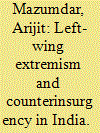

|
|
|
|
|
| Publication |
2013.
|
| Summary/Abstract |
India has a long history of left-wing extremism. The largest and most powerful left-wing extremist group today is the Communist Party of India (CPI) (Maoist), which is active in many states across the country. Its ultimate goal is to capture power through a combination of armed insurgency and mass mobilisation. In recent times, the southern state of Andhra Pradesh has achieved notable success in counterinsurgency operations against the Maoists. This article outlines the 'Andhra model', which involves a mix of security, development and political approaches. It also examines whether this model can be replicated in other Indian states affected by left-wing extremism.
|
|
|
|
|
|
|
|
|
|
|
|
|
|
|
|
| 9 |
ID:
126094
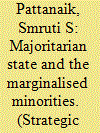

|
|
|
|
|
| Publication |
2013.
|
| Summary/Abstract |
The problem confronting the Hindu minority in Bangladesh is analysed in this article within the framework of a majoritarian state, which embodies the socio-cultural ethos of the majority community in its effort to establish itself as a nation state with a unique history. Such a state by its very nature marginalises the minorities, who are considered unequal in the construction of the 'nation state' narrative even though constitutionally they enjoy equality as citizens. While the article looks at the role of the Hindus in politics in former East Pakistan and later in Bangladesh, it also explores whether the approach adopted by the Hindu minority in recent years has provided physical security, economic and political opportunities, and made them important stakeholders. The article also analyses the future of minorities in the context of the larger national identity debate in Bangladesh.
|
|
|
|
|
|
|
|
|
|
|
|
|
|
|
|
| 10 |
ID:
126089
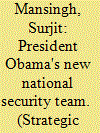

|
|
|
|
|
| Publication |
2013.
|
| Summary/Abstract |
United States President Barack Obama's new national security team for his second term in office was finally put in place at the end of February. It is an impressive team of men who share Obama's worldview and seem likely to accept the White House lead preferred by this president. The one woman, Susan Rice, added to the team as National Security Adviser in May reinforces the public image of foreign policy shaped by Obama. Their effectiveness, however, depends on more than their managerial abilities or collegiality, and the month-long unique and bruising battle in the Senate over the confirmation of defense secretary Chuck Hagel's nomination revealed some of the difficulties they will face at home, to say nothing of obstacles abroad. We describe the team briefly, look at what the confirmation process tells us about a currently dysfunctional political system in the US, and ask what might be expected from them in the near future as problems surface in many parts of the world, including the Indo-Pacific region.
|
|
|
|
|
|
|
|
|
|
|
|
|
|
|
|
| 11 |
ID:
126098
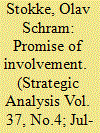

|
|
|
|
|
| Publication |
2013.
|
| Summary/Abstract |
In late 2012, the first liquefied natural gas tanker to sail through the Northern Sea Route reached its destination in Japan, carrying gas from a Euro-Arctic offshore field. Only months earlier, a Korean-owned naval architecture and engineering company had won the contract for designing the long-awaited new icebreaker for Canada's coast guard, 1 and China had completed its fifth Arctic marine survey from its own ice-capable research vessel. The same year saw India apply for permanent observer status in the Arctic Council, a high-level forum for addressing Arctic issues, thus joining an expanding group of Asian applicants that already counted China, Japan, Korea and Singapore. The recent surge in Asian interest in the Arctic has been followed closely by the states of the Arctic region: Should they worry about this development, or see it as an asset in their efforts to manage the rapid changes underway in the Arctic?
|
|
|
|
|
|
|
|
|
|
|
|
|
|
|
|
| 12 |
ID:
126097


|
|
|
|
|
| Publication |
2013.
|
| Summary/Abstract |
The article seeks to assess the evolution of the Tibet question against the backdrop of the problems associated with the succession of the Dalai Lama. It also discusses the implications of all this for India and provides policy recommendations the Indian authorities could use to deal with this situation.
|
|
|
|
|
|
|
|
|
|
|
|
|
|
|
|
| 13 |
ID:
126102


|
|
|
|
|
| Publication |
2013.
|
| Summary/Abstract |
Because of global warming, the thinning ice in the Arctic is opening up the region for navigation for a few months in the summer season. The Arctic littoral countries (Canada, Norway, Denmark [Greenland], Russia and the United States), shipping companies and several other stakeholders (the EU and Asian countries such as China, Japan, Singapore and South Korea) are closely tracking shipping related developments in the Arctic and developing strategies to exploit the Northern Sea Route (NSR).
This article argues that the NSR offers a mixed bag of opportunities and challenges and would require the technological upgrade of platforms, navigational facilities, trained human resource and a cargo base to encourage shipping companies to deploy vessels along the new routes. Furthermore, stakeholders would need to be conscious of the adverse impact of commercial and human activity on the Arctic ecology.
|
|
|
|
|
|
|
|
|
|
|
|
|
|
|
|
| 14 |
ID:
126101


|
|
|
|
|
| Publication |
2013.
|
| Summary/Abstract |
It was the privately-sponsored Russian expedition to the North Pole in August 2007 that opened a new competitive era in Arctic geopolitics, and the technologically elegant PR-trick with planting the flag into the crisscross point of meridians on the depth of 4,261 m produced a resonance that distorted strategic thinking about, and political interactions in the Arctic region. Six years later, the dust of over-excited forecasts of unregulated confrontation across the Northern frontier has mostly settled down and the atmosphere of cooperation has become prevalent, but Russian Arctic policy is in new disarray. With its large population centres (like Murmansk or Norilsk) beyond the Polar circle and huge resource-extraction industry, Russia is objectively the Arctic superpower, and the high concentration of strategic forces on the Kola Peninsula adds a heavy military dimension to this status, but Moscow is nervous about protecting its interests against encroachments of ambiguous neighbours and ambitious newcomers. 1 The discourse of 'conquering' and 'owning' the High North is organic to the Russian state identity, incoherent as it is, and is often exploited as political expediency dictates, which increases the sensitivity of public opinion to setbacks and accidents that tend to bedevil many Arctic projects. There is a rich tradition of exploring and developing the vast inhospitable territories and seas, but the attention to environmental issues and to the rights of indigenous peoples is strikingly low. This article focuses on the crucial importance of issues pertaining to sovereignty in Russian policy-making, while starting with examining the revised evaluations of Arctic resources and continuing with assessing the usefulness of military build-up.
|
|
|
|
|
|
|
|
|
|
|
|
|
|
|
|
| 15 |
ID:
126093


|
|
|
|
|
| Publication |
2013.
|
| Summary/Abstract |
Nepal's King Prithvi Narayan Shah's famous 'Yam between two boulders' quote reflects the great understanding of Nepal's security dilemma, even as far back as the 18th century. 1 This has remained a cornerstone of Nepal's foreign policy to date, primarily driven by Nepal's geographic location. 2 Shah understood well that Nepal would always remain insecure vis-à-vis its powerful neighbours, that is, China and India, and urged the need to keep refining, adapting and adjusting Nepal's foreign policy in order to deal with its powerful regional neighbours. However, successive Nepalese governments have looked to build ties with its powerful neighbours to bolster their own hold on power rather than to maintain the difficult balancing act outlined by Shah. This trend will continue in the foreseeable future, unless Nepal as a nation is ready to conduct its foreign policy as per the imperatives of the 21st century world, dominated by the rise of China and India. While both China and India are competing for global and regional influence, there is also a concern about securing their interests in their close neighbourhoods. Both countries are vying for influence in Nepal as they fear that Nepali soil can be used to harm their respective core interests. 3 Ultimately, as argued by Manish Dabhade and Harsh V. Pant, both countries have increased their interference in Nepal, while severely undermining 'Nepal's sovereignty and its ability to cope' with these regional giants effectively. 4 In light of this, this commentary focuses its attention on the primacy of the element of change in Nepal's foreign policy and attempts to propose 'trilateral security cooperation' as a new foreign policy for Nepal to manage the growing China-India strategic interests in Nepal. The proposed change in Nepal's foreign policy is to manage the increasing foreign and security policy challenges of China and India in Nepal.
|
|
|
|
|
|
|
|
|
|
|
|
|
|
|
|
|
|
|
|
|